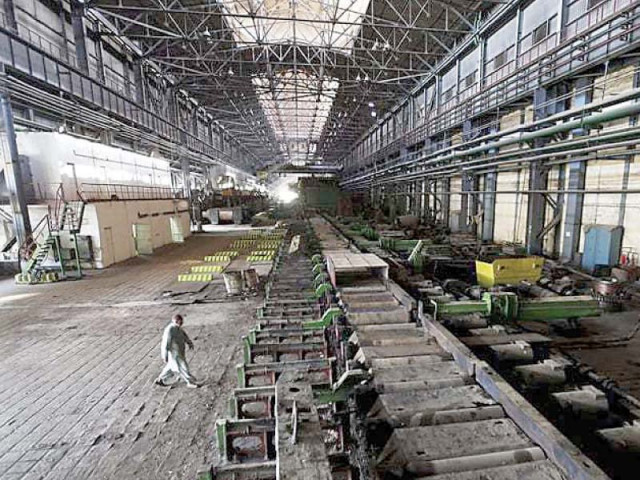Pakistan Steel Mills in further trouble as losses swell to Rs200b
PPP, PML-N govts failed to prevent collapse of the industrial giant

PSM, in a petition, asked the National Tariff Commission to slap anti-dumping duties on cheap steel imports that were among primary reasons for the collapse of the industrial giant. PHOTO: FILE
According to documents available with The Express Tribune, PSM had notched up cumulative profit of Rs9.54 billion up to financial year 2007-08 during the tenure of Pervez Musharraf’s government.
However, the state-owned mill, which had been built with Russian assistance decades ago, started crumbling after the PPP administration took reins of the country back in 2008.
According to sources, a major reason behind the mill’s failure was thousands of new appointments made by the PPP government. PSM’s manpower requirement could be met by 9,000 employees, but their number reached 17,000, putting additional burden on the steel mill.
Another main reason was the global recession as well as other factors because of which the mill continued to suffer losses since FY09.
PSM recorded a loss of Rs16.9 billion in 2008-09, which jumped to Rs118.7 billion in five years. When the PML-N government came to power, PSM’s loss continued to swell and reached Rs200 billion at the end of its tenure on May 31, 2018.
In FY09, the mill had suffered the loss in the wake of decrease in sales, high prices of imported raw material and low capacity utilisation.
Sales weakened due to the global economic recession and the halt to government’s development projects under the Public Sector Development Programme (PSDP) to curb overall expenditure.
Liquidity crunch in the country, import of steel products at lower prices and closure of production units of the steel mill due to gas outages were other drawbacks.
A flood of cheap steel imports from China created hurdles in the way of smooth functioning of the steel mill.
In order to counter that, PSM, in a petition, asked the National Tariff Commission to slap anti-dumping duties on cheap steel imports that were among primary reasons for the collapse of the industrial giant.
After missing the deadline to revive the mill, officials of the Ministry of Industries and Production appeared to be convinced that real reasons for the hefty losses were not only its operational challenges, bad management and poor plant maintenance, but also competition with cheap steel imports from China.
In a meeting of the Economic Coordination Committee held on March 19, 2016, the ministry officials held the Pakistan-China free trade agreement, in force since 2007, responsible for the mill’s financial collapse.
Dost Steels set to start trial production of new plant
They also acknowledged that PSM’s failure to meet capacity utilisation targets came as a result of forced closure of one of its plants due to poor maintenance.
Earlier, attempts to sell off the mill were abandoned in 2006 following a Supreme Court judgment that said the process lacked transparency.
The industries ministry had been tasked during the PML-N government’s tenure with increasing the mill’s capacity utilisation to 77%, a level where it would break even, by January 2015 and then it would be put up for sale.
According to the Rs18.5-billion bailout and turnaround plan for PSM approved in April 2014, the ministry was supposed to help the mill hit 60% production capacity by November 2014.
Larger bench formed to revisit decision on privatisation of Pakistan Steel Mills
However, it could not meet the goal because of unexpected shutdown of the mill in the face of poorly maintained infrastructure.
Public utility Sui Southern Gas Company (SSGC) also suddenly stopped gas supply to the steel mill over payment dispute, which brought steel production to a halt in June 2015.
Since then, PSM has exhausted its finished inventory, but has not been permitted to sell unfinished stock.
PSM, which owes Rs19 billion to SSGC, had been operating at average 33% capacity when the gas utility suddenly cut off supplies. Since then, the mill had not been operating and its losses had continued to mount.
Bilawal criticises government’s privitisation policy for PIA, Pakistan Steel Mills
An official pointed out that it was a surprise for the industries’ ministry that SSGC had been providing gas to K-Electric despite overdue payment of billions of rupees, but it disconnected supplies to the steel mill when it was stepping towards revival.
Published in The Express Tribune, July 3rd, 2018.
Like Business on Facebook, follow @TribuneBiz on Twitter to stay informed and join in the conversation.


















COMMENTS
Comments are moderated and generally will be posted if they are on-topic and not abusive.
For more information, please see our Comments FAQ